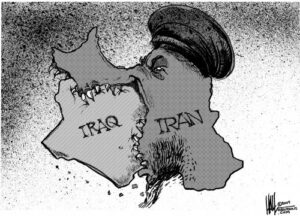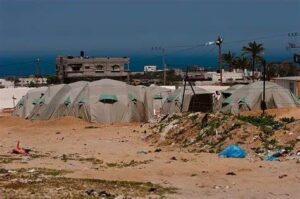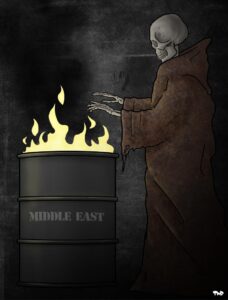How 2003 Shaped the Region
I believe that the growth of Iranian influence following the United States invasion of Iraq was the most important outcome of the United States’ 2003 invasion of Iraq. Before the United States invaded Iraq, Iran, and Iraq had engaged in a decades-long struggle for influence in the region. This fight for influence remained constant throughout the Baathist regime, the Iranian Revolution, and other major ideological shifts in the leadership of both states. The fight for influence between Iran and Iraq characterized regional politics from the 1950s until the United State’s invasion. This was evident in the Iran-Iraq war, the fomentation of Kurdish violence by Iran, and tensions over the Shatt Al-Arab.
Following the United States’ movement into Iraq in 2003 the Baathist Party was overthrown. The United State’s removal of the once-powerful Baathist party severely weakened Iraq and led to a power vacuum. This power vacuum came because the United States wanted to remove all of the Baath party’s influence in this country. Now there were no leaders, soldiers, or teachers, and neighboring Iran recognized this (Calculli, 232).

The Influence of the Baathist Party is Removed
BBC NEWS | Programmes | From Our Own Correspondent | Why it’s different in Basra
Iran for decades had fought to push influence into Iraq as demonstrated by Ruhollah Khomeini’s calls to export Islam and funding of the Kurds to undermine the Arab Iraqi government (Ismael, 19, 22). Iran had now finally won this long fight to undermine Iraqi influence in the region. Iran would soon begin pushing Iranian influence in the writing of the new Iraqi constitution, the military, and the new Iraqi government (Nader, 6), (Litvak, Landau, Kames, 42-45). Iran did this not only to push their ideals into Iraq but to also begin to push regional influence.
The growth of Iranian influence is important because today Iran is one of the most powerful states in the region. Iran’s oil and nuclear capabilities have been major questions in the region. These questions greatly shift the politics of other states in the region as well as foreign states policies towards the region such as the United States. This comes due to the realist need to counter the growing influence of Iran.
Iran without the threat of Iraq on its border has been able to engage in various measures to grow its influence. As previously stated this has been evident in their engagement in nuclear proliferation. As a result of this nuclear proliferation, regional tensions are made worse as states fear the development of nuclear weapons. This further strains diplomatic relations in the region as well as between Iran and other countries in the international system. I believe that if Iran was still tasked with focusing on Iraq it would not have had the time and resources necessary to continue to develop expensive nuclear weapons.

Iran Pushes its Influence into Iraq
Iran has also tried to build influence in the region through funding proxies in countries like Yemen and Syria. As a result of this funding of proxies, Iran has been able to push Iranian goals and influence in other states in the region (Litvak, Landau, Kames, 46). Furthermore, this fighting and use of proxies has led to greater conflict and stalemates in countries like Syria. This conflict leads to issues such as human rights concerns and refugee problems. These problems also contribute to diplomatic tensions and intermestic issues which prevent collaboration in the region (Ismail, Coutts, Rayes, Roborgh, Abbara, Orcutt, Fouad, 4). As stated in other blog posts, cooperation among states in the region is needed to address a variety of issues.
Finally, Iran has pushed influence by fighting terror in the region. To grow Iranian influence Iran has proclaimed itself the protector of the region. Iran has used air strikes to fight terrorist organizations. Iran has stated that this action demonstrates that they are doing much more for the region than other influential states like Turkey and Saudi Arabia (Nader, 16). Overall while fighting terrorism leads to regional stability, this rhetoric continues the cold conflict for power and influence in the Middle East. This cold conflict comes through the use of proxies between Iran and other states to push their influence and grow prestige within the region. This cold conflict prevents collaboration among states needed to address concerns which may potentially impact the future of the Middle East.
Calculli, Marina. 2019. “Middle East Security: The Politics of Violence after the 2003 Iraq War”
In International Relations of the Middle East, 5th ed., edited by Louise Fawcett, 226-244. Oxford: Oxford University Press.
Ismael, Tareq Y. 1982. Iraq and Iran : Roots of Conflict. First edition. Syracuse, N.Y: Syracuse
University Press.
Ismail, Sharif A, Adam P Coutts, Diana Rayes, Sophie Roborgh, Aula Abbara, Miriam Orcutt, Fouad M Fouad. 2018. “Informal Health Work in Fragile and Conflict-Affected Settings.” Refugees, Healthcare and Crises: Informal Syrian Health Workers in Lebanon. International Institute for Environment and Development. http://www.jstor.org/stable/resrep16510.7.
Nader, Alireza. 2015. “Iranʹs Role in Iraq: Room for U.S.-Iran Cooperation?” RAND
Corporation, http://www.jstor.org/stable/resrep02425.

